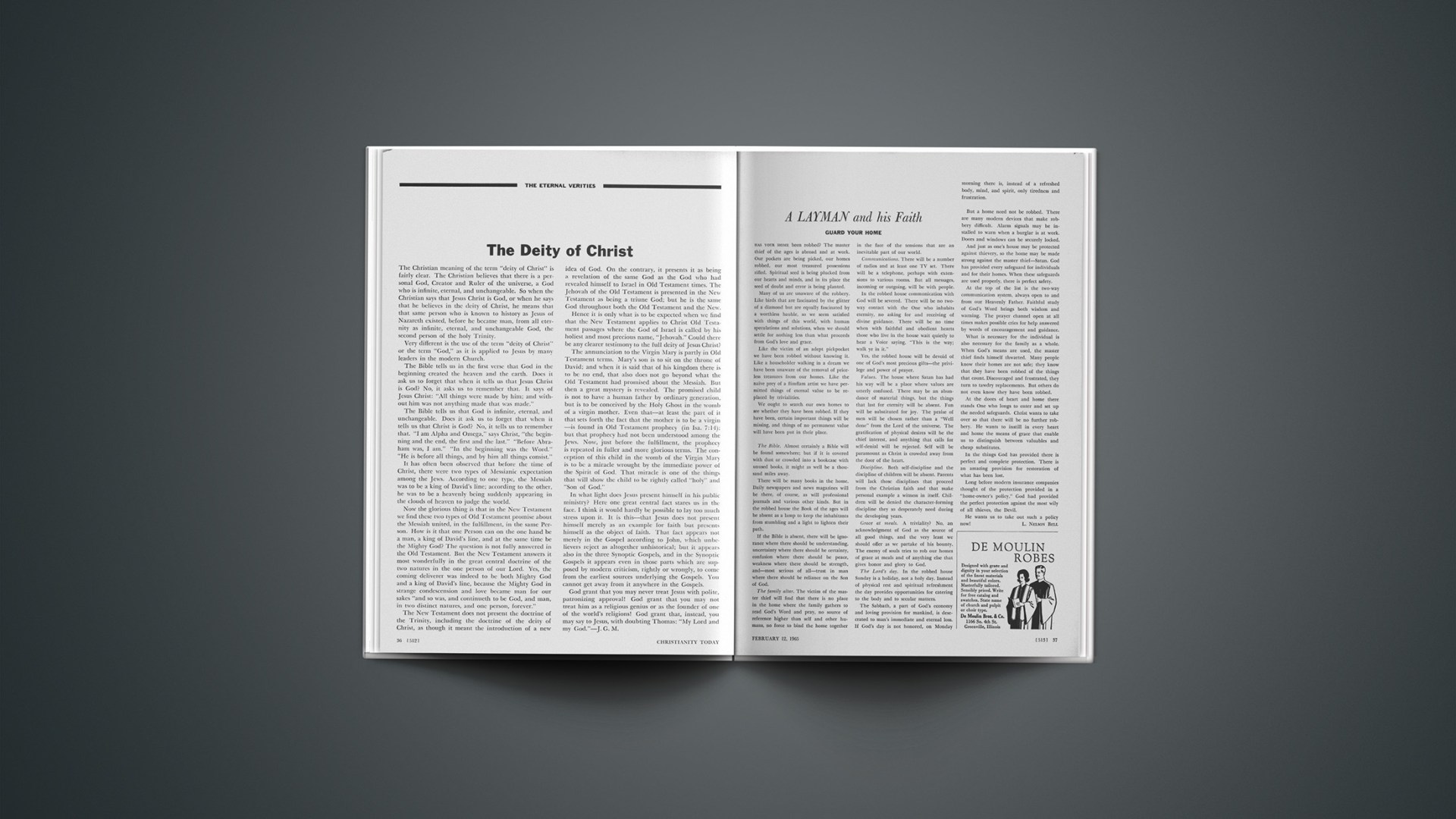The Christian meaning of the term “deity of Christ” is fairly clear. The Christian believes that there is a personal God, Creator and Ruler of the universe, a God who is infinite, eternal, and unchangeable. So when the Christian says that Jesus Christ is God, or when he says that he believes in the deity of Christ, he means that that same person who is known to history as Jesus of Nazareth existed, before he became man, from all eternity as infinite, eternal, and unchangeable God, the second person of the holy Trinity.
Very different is the use of the term “deity of Christ” or the term “God,” as it is applied to Jesus by many leaders in the modern Church.
The Bible tells us in the first verse that God in the beginning created the heaven and the earth. Does it ask us to forget that when it tells us that Jesus Christ is God? No, it asks us to remember that. It says of Jesus Christ: “All things were made by him; and without him was not anything made that was made.”
The Bible tells us that God is infinite, eternal, and unchangeable. Does it ask us to forget that when it tells us that Christ is God? No, it tells us to remember that. “I am Alpha and Omega,” says Christ, “the beginning and the end, the first and the last.” “Before Abraham was, I am.” “In the beginning was the Word.” “He is before all things, and by him all things consist.”
It has often been observed that before the time of Christ, there were two types of Messianic expectation among the Jews. According to one type, the Messiah was to be a king of David’s line; according to the other, he was to be a heavenly being suddenly appearing in the clouds of heaven to judge the world.
Now the glorious thing is that in the New Testament we find these two types of Old Testament promise about the Messiah united, in the fulfillment, in the same Person. How is it that one Person can on the one hand be a man, a king of David’s line, and at the same time be the Mighty God? The question is not fully answered in the Old Testament. But the New Testament answers it most wonderfully in the great central doctrine of the two natures in the one person of our Lord. Yes, the coming deliverer was indeed to be both Mighty God and a king of David’s line, because the Mighty God in strange condescension and love became man for our sakes “and so was, and continueth to be God, and man, in two distinct natures, and one person, forever.”
The New Testament does not present the doctrine of the Trinity, including the doctrine of the deity of Christ, as though it meant the introduction of a new idea of God. On the contrary, it presents it as being a revelation of the same God as the God who had revealed himself to Israel in Old Testament times. The Jehovah of the Old Testament is presented in the New Testament as being a triune God; but he is the same God throughout both the Old Testament and the New.
Hence it is only what is to be expected when we find that the New Testament applies to Christ Old Testament passages where the God of Israel is called by his holiest and most precious name, “Jehovah.” Could there be any clearer testimony to the full deity of Jesus Christ?
The annunciation to the Virgin Mary is partly in Old Testament terms. Mary’s son is to sit on the throne of David; and when it is said that of his kingdom there is to be no end, that also does not go beyond what the Old Testament had promised about the Messiah. But then a great mystery is revealed. The promised child is not to have a human father by ordinary generation, but is to be conceived by the Holy Ghost in the womb of a virgin mother. Even that—at least the part of it that sets forth the fact that the mother is to be a virgin—is found in Old Testament prophecy (in Isa. 7:14); but that prophecy had not been understood among the Jews. Now, just before the fulfillment, the prophecy is repeated in fuller and more glorious terms. The conception of this child in the womb of the Virgin Mary is to be a miracle wrought by the immediate power of the Spirit of God. That miracle is one of the things that will show the child to be rightly called “holy” and “Son of God.”
In what light does Jesus present himself in his public ministry? Here one great central fact stares us in the face. I think it would hardly be possible to lay too much stress upon it. It is this—that Jesus does not present himself merely as an example for faith but presents himself as the object of faith. That fact appears not merely in the Gospel according to John, which unbelievers reject as altogether unhistorical; but it appears also in the three Synoptic Gospels, and in the Synoptic Gospels it appears even in those parts which are supposed by modern criticism, rightly or wrongly, to come from the earliest sources underlying the Gospels. You cannot get away from it anywhere in the Gospels.
God grant that you may never treat Jesus with polite, patronizing approval! God grant that you may not treat him as a religious genius or as the founder of one of the world’s religions! God grant that, instead, you may say to Jesus, with doubting Thomas: “My Lord and my God.”—J. G. M.










